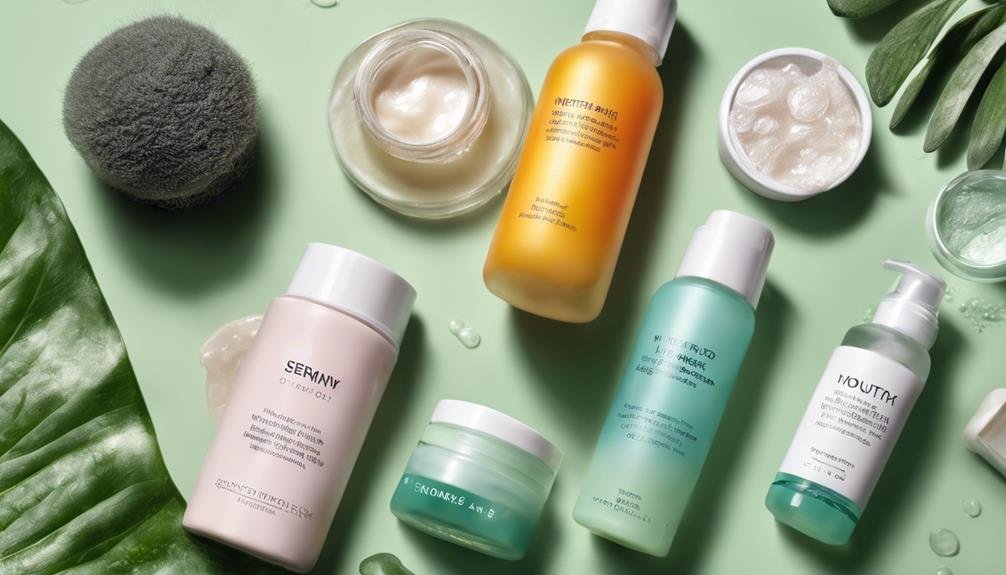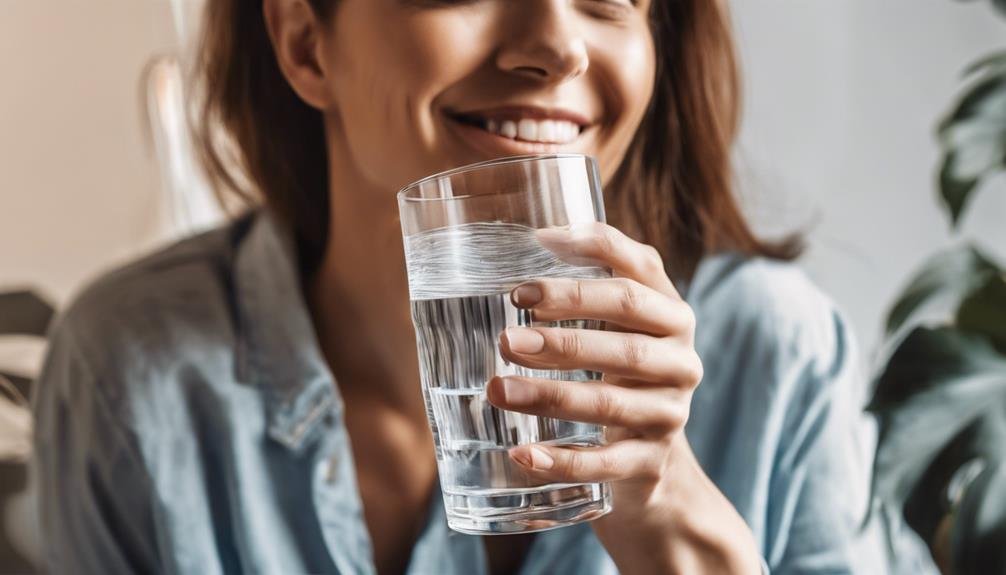Imagine your skin as a flourishing garden in need of constant nourishment – hydration is the water that keeps it vibrant and thriving. But how do you ensure your skin stays adequately hydrated to maintain that healthy glow? Let's explore some effective tips and strategies that can help you achieve and maintain optimal skin hydration levels for a radiant complexion.
Importance of Hydration
Regular hydration is essential for maintaining healthy skin. Skin elasticity, the ability of your skin to stretch and bounce back, is closely tied to your hydration balance. When your skin lacks proper hydration, it can become dry, tight, and less elastic. Dehydrated skin is more prone to fine lines, wrinkles, and sagging, making it essential to prioritize hydration in your skincare routine.
Maintaining a good hydration balance helps your skin look plump, radiant, and youthful. Water is a fundamental component of healthy skin, as it supports the skin barrier function and aids in the delivery of essential nutrients to skin cells. When you stay hydrated, your skin is better equipped to repair and regenerate, leading to a more vibrant complexion.
To enhance your skin's elasticity and overall health, remember to drink an adequate amount of water daily and incorporate hydrating products into your skincare regimen. By prioritizing hydration, you can support your skin's natural functions and maintain a glowing, youthful appearance.
Drink Plenty of Water
Hydration is the cornerstone of skin health, and one of the most effective ways to ensure your skin stays supple and vibrant is by drinking plenty of water. Water intake plays a crucial role in maintaining the health and appearance of your skin.
Here are some key reasons why staying hydrated is essential for skin health:
- Optimal Hydration: Adequate water intake helps keep your skin cells hydrated, leading to a more plump and youthful appearance.
- Toxin Elimination: Water flushes out toxins from the body, reducing the likelihood of skin issues like acne and dullness.
- Improved Elasticity: Proper hydration enhances skin elasticity, making it less prone to wrinkles and sagging.
Use Hydrating Skincare Products
For maintaining optimal skin hydration, incorporating hydrating skincare products into your daily routine is crucial. When selecting products, consider your skin type to ensure the best results.
For dry skin, look for rich creams containing ingredients like hyaluronic acid and glycerin to deeply moisturize and nourish.
Oily skin types should opt for lightweight, non-comedogenic formulas with ingredients such as niacinamide and salicylic acid to hydrate without clogging pores.
Product recommendations can include hydrating serums, moisturizers, and face masks tailored to your specific needs. When applying these products, start with a clean face and gently massage in circular motions to promote absorption. Layering lighter products before heavier ones can help lock in moisture effectively.
Ingredient benefits like antioxidants in vitamin C serums can protect against environmental damage, while peptides in moisturizers can support collagen production for a plumper, more youthful complexion.
Eat Water-Rich Foods
To further enhance your skin's hydration levels and overall health, consider incorporating water-rich foods into your daily diet. Consuming fruits and vegetables with high water content can provide numerous benefits for your skin health. Hydration benefits from these foods not only help keep your skin plump and youthful but also support its natural functions, such as regulating temperature and aiding in nutrient transport.
- Hydration Benefits: Water-rich foods like cucumbers, watermelon, and oranges are excellent choices to boost your skin's hydration levels and maintain a healthy glow.
- Skin Health: By including foods such as strawberries, tomatoes, and spinach in your diet, you can supply your skin with essential vitamins and antioxidants that promote overall skin health.
- Nutrient Absorption: Water-rich foods not only hydrate your skin but also aid in the absorption of key nutrients necessary for skin repair and rejuvenation.
Limit Alcohol and Caffeine Intake
When it comes to maintaining healthy skin, being mindful of your alcohol and caffeine intake can significantly impact its appearance and hydration levels. Alcohol and caffeine are known to dehydrate the body, leading to dry, lackluster skin. Both substances act as diuretics, causing increased urine production and ultimately resulting in the loss of essential moisture in your skin. To combat this, focus on hydrating alternatives like water, herbal teas, or infused water with fruits and herbs.
Additionally, alcohol and caffeine can interfere with your hydration and exercise routine. Dehydration from these substances can hinder your body's ability to perform at its best during physical activity, affecting your skin's overall health.
Moreover, these stimulants can disrupt your sleep patterns, leading to inadequate rest, which is crucial for skin rejuvenation and hydration. By limiting your intake of alcohol and caffeine, you can support your skin's hydration and overall well-being, ensuring a radiant and healthy complexion.
Moisturize Regularly
Maintaining healthy skin involves more than just watching your alcohol and caffeine intake. One crucial aspect of skincare is to moisturize regularly. Proper moisturization helps in maintaining the skin barrier, which is essential for healthy and glowing skin.
External factors such as pollution, UV rays, and harsh weather conditions can compromise the skin barrier, leading to dryness and irritation. By incorporating a regular moisturizing routine into your skincare regimen, you can help protect and strengthen your skin barrier.
- Hydrate your skin with a suitable moisturizer at least twice a day.
- Choose moisturizers with ingredients like hyaluronic acid or ceramides to boost hydration and repair the skin barrier.
- Tailor your moisturizer choice based on your skin type – whether it's oily, dry, combination, or sensitive.
Consider Humidifiers
Considering the impact of indoor environments on your skin health, employing a humidifier can play a significant role in maintaining optimal hydration levels. Humidifier benefits include helping to balance moisture in the air, which in turn benefits your skin. By adding moisture to the air, humidifiers can prevent your skin from becoming dry and help retain its natural hydration. This can be especially beneficial during dry seasons or in areas with low humidity levels.
To further highlight how using a humidifier can benefit your skin, take a look at the table below:
| Humidifier Benefits | Impact on Skin |
|---|---|
| Balances moisture | Prevents skin dryness |
| Improves hydration | Enhances skin's natural moisture |
| Supports skin care | Helps maintain healthy skin barrier |
Avoid Hot Showers
To promote optimal skin health, it's advisable to avoid indulging in hot showers excessively. Hot water can strip your skin of its natural oils, leading to dryness and irritation. Instead, opt for lukewarm water to cleanse your skin gently without causing damage.
Here are some benefits of incorporating cold showers into your skincare routine:
- Helps retain skin moisture: Cold showers can help seal the pores, preventing essential oils from being stripped away and promoting hydration.
- Improves blood circulation: Cold water can stimulate blood flow, which is beneficial for overall skin health and can give your skin a healthy glow.
- Reduces inflammation: Cold showers can help soothe irritated skin and reduce redness, making it a great addition to your skincare routine.
Protect Your Skin From the Sun
Indulging in hot showers excessively can harm your skin's natural oils, causing dryness and irritation.
When it comes to protecting your skin from the sun, sunscreen application is key. Sunscreen helps shield your skin from harmful UV rays that can lead to premature aging and skin damage. Make sure to choose a broad-spectrum sunscreen with an SPF of 30 or higher and apply it generously at least 15 minutes before sun exposure. Reapply every two hours or more frequently if swimming or sweating.
In addition to sunscreen, seek shade protection whenever possible, especially during peak sun hours between 10 a.m. and 4 p.m. Wearing protective clothing like hats, sunglasses, and long sleeves can also help minimize sun exposure.
Monitor Your Skin's Hydration Levels
For optimal skin health, it's important to monitor your skin's hydration levels regularly. Proper monitoring can help you understand your skin's needs and make adjustments to keep it hydrated and healthy.
Here are some tips to effectively monitor your skin's hydration levels:
- Skin Hydration Monitoring Technology: Utilize advanced skincare tools like hydration monitors or apps that can provide accurate readings of your skin's moisture levels.
- Observe Skin Hydration: Pay attention to how your skin feels and looks on different days to identify any changes that may indicate dehydration or excessive dryness.
- Consider Weather Changes: Be mindful of how weather fluctuations affect your skin's hydration levels. Adjust your skincare routine accordingly during hot, dry days or cold, windy weather to maintain optimal hydration.
Frequently Asked Questions
Can Over-Hydration Negatively Impact Skin Health?
Yes, over-hydration can negatively impact skin health. Maintaining hydration balance is crucial for skin elasticity. Excessive water intake may disrupt this balance, leading to issues like skin puffiness and decreased elasticity. Moderation is key for healthy skin.
Do Different Skin Types Require Different Hydration Levels?
Depending on your skin type, hydration needs vary. Oily skin may require lighter moisturizers, while dry skin benefits from richer products. Sensitive skin needs gentle hydration, and normal skin thrives with balanced moisture levels.
Is There an Ideal Water Temperature for Hydrating Skin?
When hydrating skin, using lukewarm water is key. Avoid extremes like hot or cold water, as they can strip natural oils. Remember, this simple step can debunk hydration myths and keep your skin balanced and healthy.
Can Hydration Levels Affect Skin Conditions Like Acne?
Yes, hormonal influence can impact skin conditions like acne. Imbalanced hormone levels may increase sebum production, leading to breakouts. Furthermore, dietary implications play a role; consuming high-glycemic foods can exacerbate acne. Proper hydration can help regulate hormones and support clearer skin.
How Does Exercise Impact Skin Hydration Needs?
Exercise benefits your skin's hydration balance by increasing blood flow, promoting nutrient delivery to skin cells, and supporting collagen production. Sweating during exercise helps regulate body temperature and unclog pores, enhancing overall skin health.
Conclusion
In conclusion, by following these hydration tips for healthy skin, you can ensure that your skin stays moisturized and radiant. Remember to stay hydrated, both internally and externally, to support your skin's natural functions. By making small adjustments to your daily routine and lifestyle choices, you can maintain a healthy glow and promote overall skin health. Keep up the good work and enjoy the benefits of well-hydrated skin!







